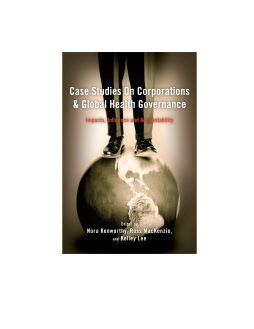
BOOK
Case Studies on Corporations and Global Health Governance
Nora Kenworthy | Ross MacKenzie | Kelley Lee
(2016)
Additional Information
Book Details
Abstract
There is growing evidence of the wide-ranging impacts of corporations in selected industries on global patterns of health and disease. However, limited analysis has been undertaken of the increasing corporate involvement in collective action needed to effectively address these impacts.
This book brings together a wide ranging collection of case studies that provide new empirical research on how corporations impact on, influence of, and could be held more accountable to, global health governance. Written by leading and emerging scholars from a broad range of disciplinary perspectives, each case study seeks to expand the methods, conceptual approaches and sources of data used to address three key questions:
- What impacts are corporations having on global health governance?
- How do corporations shape and influence global health governance in ways that protect and promote their own interests?
- What forms of global health governance are needed to mediate these corporate impacts in ways that protect and promote population health?
Also, for a practical guide on how to conduct research on the impact of corporations on global health and global health governance, see the partner volume: http://www.rowmaninternational.com/books/researching-corporations-and-global-health-governance
Nora Kenworthy is an Assistant Professor in the School of Nursing and Health Studies at the University of Washington Bothell.
Ross MacKenzie is a lecturer in the Department of Psychology at Macquarie University in Sydney, Australia
Kelley Lee is Tier 1 Canada Research Chair in Global Health Governance and Professor in the Faculty of Health Sciences, Simon Fraser University, Canada.
It is hard to overstate the profound influence of international corporations on global health—from tobacco, alcohol and food to injuries and occupational safety. The most fundamental problem in a globalized world is how to govern corporations and hold them accountable. In their brilliant book, Kenworthy, MacKenzie and Lee unmask the influence corporations have on human health and offer innovative solutions for transparency and good governance. If scholars and health advocates want to truly understand the complex intersection between corporations and health, this book is essential reading.
Lawrence O. Gostin, Director, World Health Organization Collaborating Center on Public Health Law & Human Rights
Nora Kenworthy is an Assistant Professor in the School of Nursing and Health Studies at the University of Washington Bothell.
Ross MacKenzie is a lecturer in the Department of Psychology at Macquarie University in Sydney, Australia
Kelley Lee is Tier 1 Canada Research Chair in Global Health Governance and Professor in the Faculty of Health Sciences, Simon Fraser University, Canada.
It is hard to overstate the profound influence of international corporations on global health—from tobacco, alcohol and food to injuries and occupational safety. The most fundamental problem in a globalized world is how to govern corporations and hold them accountable. In their brilliant book, Kenworthy, MacKenzie and Lee unmask the influence corporations have on human health and offer innovative solutions for transparency and good governance. If scholars and health advocates want to truly understand the complex intersection between corporations and health, this book is essential reading.
Lawrence O. Gostin, Director, World Health Organization Collaborating Center on Public Health Law & Human Rights
Table of Contents
| Section Title | Page | Action | Price |
|---|---|---|---|
| Contents | 7 | ||
| Preface | 9 | ||
| List of Acronyms | 13 | ||
| List of Figures | 17 | ||
| List of Tables | 19 | ||
| Chapter One: Introduction | 21 | ||
| I: Impacts of Corporations on Global Health | 29 | ||
| Chapter Two: Governing through Production | 31 | ||
| Chapter Three: Medicalisation and Commodification of Smoking Cessation | 47 | ||
| Chapter Four: The Influence of the Food Industry on Public Health Governance | 61 | ||
| Chapter Five: Examples of Failures to Regulate Mining and Smelting Emissions and Their Consequent Effects on Human Health Outcomes | 73 | ||
| II: Corporate Influence of Global Health Governance | 91 | ||
| Chapter Six: Informal Channels of Corporate Influence on Global Health Policymaking | 93 | ||
| Chapter Seven: How Corporations Shape Our Understanding of Problems with Gambling and Their Solutions | 109 | ||
| Chapter Eight: Corporate Manipulation of Global Health Policy | 123 | ||
| Chapter Nine: The Entrenchment of the Public-Private Partnership Paradigm | 139 | ||
| Chapter Ten: Trade and Investment Agreements | 151 | ||
| Chapter Eleven: Health Policy, Corporate Influence and Multi-Level Governance | 165 | ||
| Chapter Twelve: Tobacco Industry Strategies to Influence Global Governance | 179 | ||
| III: Holding Corporations to Account | 195 | ||
| Chapter Thirteen: A Proposed Approach to Systematically Identify and Monitor the Corporate Political Activity of the Food Industry with Respect to Public Health Using Publicly Available Information | 197 | ||
| Chapter Fourteen: Regulating Baby Food Marketing: Civil Society versus Private Sector Influence | 219 | ||
| Chapter Fifteen: Epidemiology in the Struggle over Contamination of the Ecuadorian Amazon | 233 | ||
| Chapter Sixteen: Citizens United, Public Health and Democracy | 247 | ||
| Chapter Seventeen: Conclusion | 263 | ||
| Index | 271 | ||
| About the Contributors | 285 |
